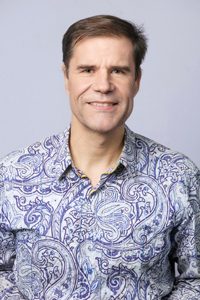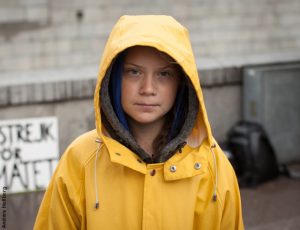By Mathis Wackernagel, Ph.D., Co-founder and president, Global Footprint Network
 Greta Thunberg stunned the COP Climate Conference in Poland in December 2018 with her clarity and honesty. Just 15 years old, she told the UN—”You say you love your children above all else, and yet, you’re stealing their future in front of their very eyes.”
Greta Thunberg stunned the COP Climate Conference in Poland in December 2018 with her clarity and honesty. Just 15 years old, she told the UN—”You say you love your children above all else, and yet, you’re stealing their future in front of their very eyes.”
Now she is 16 and has stepped up her game. After being on school strike herself every Friday since August 2018, she has inspired school strikes around the world. The next big one is March 15th.
Why are school children striking? Simply because:
School children are required to attend school. But with the worsening Climate Destruction this goal of going to school begins to be pointless.
—Why study for a future, which may not be there?
—Why spend a lot of effort to become educated, when our governments are not listening to the educated?
(from https://fridaysforfuture.org/)
It impresses me that children can access deeper truth with such clarity, and vocalize it rather than repress it. This is something to which we all, young and old, could draw inspiration from. It is time to address our environmental crisis instead of normalize it.
Demanding more than what our one planet can provide (from food production to carbon absorption) is not a long-term option. (How many planets does it take if everybody lives like you? Easy to find out—just visit www.footprintcalculator.org.) The only true choice is how well we want to live given the one-planet context.
Foresight and innovation
While our planet is finite, human possibilities are not. The transformation will succeed by applying people’s greatest strengths: foresight and innovation. We can address our food system—already today, food production takes up half of the planet’s renewable capacity. We can also rebuild our energy systems, and make them renewable and one-planet compatible. We can support smart urban transformation, given that 80% of the population will soon reside in cities. And then it matters how many we are. Investing in smaller families provides not only short-term social benefits for the next generation (better education and health), but also dramatic ecological benefits in the longer run.
What do the leaders of 2050 want today?
 As Greta and her friends have pointed out, the rapid transformation called for in order to comply with the Paris Agreement requires moving out of fossil fuels way before 2050. Given that, who are the most important people to engage with? To me it is clear: those born after 1985. Still under 65 years old in 2050, they are the ones who will still be in the workforce; they will be the captains of Spaceship Earth in 2050.
As Greta and her friends have pointed out, the rapid transformation called for in order to comply with the Paris Agreement requires moving out of fossil fuels way before 2050. Given that, who are the most important people to engage with? To me it is clear: those born after 1985. Still under 65 years old in 2050, they are the ones who will still be in the workforce; they will be the captains of Spaceship Earth in 2050.
The question to them is simple: What do YOU want, given the fact that we live on this one, overstretched planet? What do you want so your generation can still have a chance of being prosperous? Forget about what “we should do.” That’s not how you move mountains. The only thing that matters, and that has transformational power, is what you really want.
Here is my offer to the ones born after 1985: Tell us what you want, invite us to help you, and tell those who are not willing to build a successful future with you on our one and only planet to get out of the way.
Do you want to take part in the school strike for the climate? See you there!
More resources
Greta Thunberg’s TedTalk: www.ted.com/speakers/greta_thunberg
Greta Thunberg’s Twitter page: https://twitter.com/GretaThunberg
School strikes: https://en.wikipedia.org/wiki/School_strike_for_climate
Worldwide: https://fridaysforfuture.org/
USA: https://www.youthclimatestrikeus.org/platform
Australia: https://www.schoolstrike4climate.com


